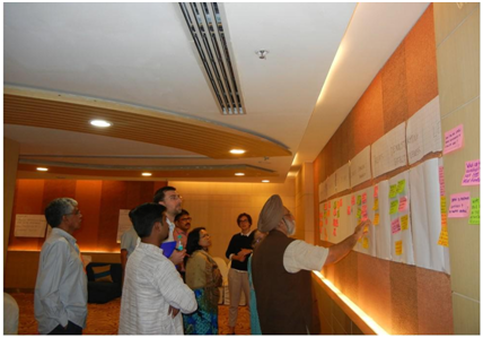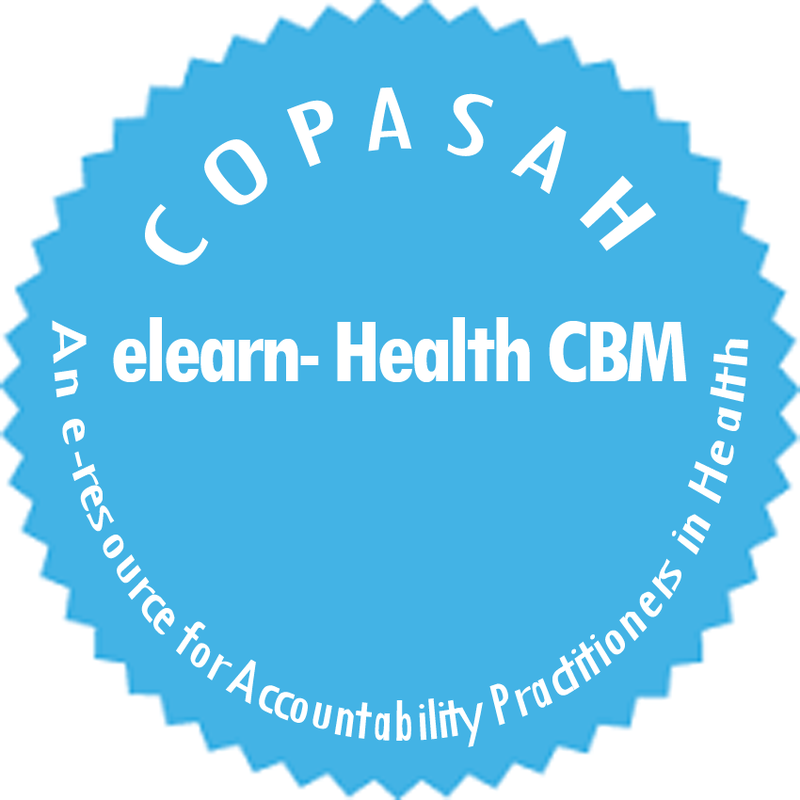
|
|
Learning about Mobilizing Accountability:
Updates from a TALEARN/COPASAH Learning Collaboration
Updates from a TALEARN/COPASAH Learning Collaboration
|
Brendan Halloran
|
|
Background
As I sit down to write about the role of social movements and grassroots organizations for state accountability, I’m drawn to reflect on the significance of today, Janu-ary 25, 2016. Five years ago, thousands, and eventually millions, of Egyptians took to the street to protest a corrupt and illegitimate regime. Tahrir Square became the epicenter of this movement, and in a few short weeks Egypt’s strong-man resigned and a democratic opening began. If only the story ended there. Un-fortunately, it did not, and Egypt is today under another military government, one that has learned the lessons of the past and has sup-pressed civil society with renewed vigor. What lessons should we draw from this experience? In my own reflection on the Tahrir Square movement, I highlight the need to build grassroots organiza-tions, not just bring people into the streets with social media-enabled mobilizing. The broader point is that we need to have a more sophisticated un-derstanding of the role of mobiliza-tions, social movements, and mem-bership-based organizations in pro-moting more democratic and ac-countable governance. |
Participants deliberating in a group exercise in TALEARN and COPASAH collaborative roundtable
|
What can we learn from historical experi-ences? And what insights need to be captured from the day-to-day struggles and decisions made by organizations? What can external actors do to support citizen-centric organizing for accountability? These questions were raised in a 2014 workshop organized by the TALEARN community of prac-tice, with COPASAH members Walter Flores and Premdas Pinto among those leading the call.
Over the next two years, a working group of COPASAH and TALEARN members has served as a space to explore the role of popu-lar movements and organizations for state accountability. I’ll briefly highlight the lessons and insights that have emerged from this en-gagement and where we might go from here.
The TALEARN community of practice brings together funders,researchers and civil society or-ganizations that share a common interest in strengthening learning about how to improve our efforts to ensure more transparent, partici-patory and accountable govern-ance. The working group on grass-roots organizations and movements saw an opportunity to generate a more robust conversation in the TALEARN group, as well as among a broader set of actors. The first step was a set of three think pieces around the title Mobilizing Accountability, to frame the issues and provide new insights and ideas.
These think pieces focus on mov-ing beyond narrow understandings of citizen engagement as either professional NGOs or individual/ community participation in exter-nally-sponsored processes. The think pieces argued instead for increased attention to the forms of mobilization and organization the citizens undertake to bolster their collective agency. Finally, the think pieces offered suggestions for how to support, not just finan-cially, these more diverse forms of grassroots organizing. The engine room collaborated on the second two notes in the series.
The think pieces were generally well received as useful resources for a range of actors trying to en-gage with these issues, comple-menting other recent papers mak-ing similar arguments. To follow up on this base, TALEARN and COPASAH cohosted a small roundtable to shape a learning agenda around social movements and grassroots organizing.
Participants deliberating in a group exercise in TALEARN and COPASAH collaborative roundtable
The meeting brought together re-searchers, NGO representatives and activists with broad experience in social movements, particularly in the Indian context. Over the course of two days we had a wide-ranging conversation about the experiences of movements, hard-won lessons, and questions that remained. These questions formed the basis for a movement-centric learning agenda. This learning agenda raises questions about lead-ership, mobilization and how movements and grassroots organi-zations engage with wider govern-ance systems. The roundtable par-ticipants were particularly inter-ested in pursuing these questions through action research, case stud-ies and real-time learning methods. We hope the learning agenda will be a resource both for movements and organizations themselves, to orient their internal learning, and the wider community of organiza-tions interested in citizen engage-ment and accountable governance. Please feel free to make use of it if you find it interesting.
Reflecting on the discussion on learning with, from and for move-ments, I was struck by the rich experiences of the participants as well as the need to have a more systematic focus. Indeed, most of the lessons coming from the move-ments and grassroots organizations reinforced ideas from the concep-tual framework that T/AI and oth-ers have been proposing for ‘Ac-countability Ecosystems’. Think-ing about the systems of actors and mechanisms for promoting ac-countability focuses our attention on the multiple pathways, points of engagement, tools and tactics, and contextual factors that must be addressed to get at the root causes of unaccountable governance and corrupt practices.
Late last year, at the most recent TALEARN workshop, we brought these perspectives together, shar-ing lessons learned from the work-ing group on social movements/ grassroots organizations and pre-senting ideas about strengthening accountability ecosystems. The workshop highlighted five key challenges for the TALEARN community, as well as the broader set of organizations working for more open and accountable gov-ernance. Most of these five issues spoke to the experiences and chal-lenges of citizens movements and grassroots organizations, such as the need for political analysis, to strengthen connections between actors and movements, to leverage a diversity of tools and tactics, and to learn and adapt as we go. Much of this is instinctive for activists around the world, but more project -oriented efforts may find it diffi-cult to incorporate these elements in their work. Thus, TALEARN serves as a frank space for conver-sation about how funders and NGOs can work to enable more strategic approaches, and ones which take into account and sup-port the efforts of broader move-ments and mobilizations.
As participants reflected on the TALEARN workshop, they dem-onstrated a more nuanced under-standing of the value and chal-lenges of learning, both within organizations and across stake-holder groups. There seems to be a growing consensus that practice-oriented learning can enable the kinds of nimble, adaptive ap-proaches that seem to be more ef-fective than pre-determined, linear projects, particularly in the chal-lenging terrain of politics and gov-ernance. But learning is not a sil-ver bullet, and it must be combined with more strategic approaches, including more active engagement with movements and grassroots organizations. Learning about ef-fective and strategic NGO-movement coalitions is an area of particular need, as some of these have shown great promise in ena-bling strategies that work at multi-ple levels (e.g. local and national) and leverage both pressure tactics and evidence-based advocacy, for example. Movements, grassroots groups, and membership-based organizations must be part of a holistic approach to strengthening accountability ecosystems, and although we have more evidence than ever, we are all still learning how best to build partnerships,capacities and strategies that re-flect these insights. There are ten-tative steps in the right direction, particularly with a shifting focus from ‘open government’ to ‘open governance’, but we need to get better at putting our insights into practice.
Over the next two years, a working group of COPASAH and TALEARN members has served as a space to explore the role of popu-lar movements and organizations for state accountability. I’ll briefly highlight the lessons and insights that have emerged from this en-gagement and where we might go from here.
The TALEARN community of practice brings together funders,researchers and civil society or-ganizations that share a common interest in strengthening learning about how to improve our efforts to ensure more transparent, partici-patory and accountable govern-ance. The working group on grass-roots organizations and movements saw an opportunity to generate a more robust conversation in the TALEARN group, as well as among a broader set of actors. The first step was a set of three think pieces around the title Mobilizing Accountability, to frame the issues and provide new insights and ideas.
These think pieces focus on mov-ing beyond narrow understandings of citizen engagement as either professional NGOs or individual/ community participation in exter-nally-sponsored processes. The think pieces argued instead for increased attention to the forms of mobilization and organization the citizens undertake to bolster their collective agency. Finally, the think pieces offered suggestions for how to support, not just finan-cially, these more diverse forms of grassroots organizing. The engine room collaborated on the second two notes in the series.
The think pieces were generally well received as useful resources for a range of actors trying to en-gage with these issues, comple-menting other recent papers mak-ing similar arguments. To follow up on this base, TALEARN and COPASAH cohosted a small roundtable to shape a learning agenda around social movements and grassroots organizing.
Participants deliberating in a group exercise in TALEARN and COPASAH collaborative roundtable
The meeting brought together re-searchers, NGO representatives and activists with broad experience in social movements, particularly in the Indian context. Over the course of two days we had a wide-ranging conversation about the experiences of movements, hard-won lessons, and questions that remained. These questions formed the basis for a movement-centric learning agenda. This learning agenda raises questions about lead-ership, mobilization and how movements and grassroots organi-zations engage with wider govern-ance systems. The roundtable par-ticipants were particularly inter-ested in pursuing these questions through action research, case stud-ies and real-time learning methods. We hope the learning agenda will be a resource both for movements and organizations themselves, to orient their internal learning, and the wider community of organiza-tions interested in citizen engage-ment and accountable governance. Please feel free to make use of it if you find it interesting.
Reflecting on the discussion on learning with, from and for move-ments, I was struck by the rich experiences of the participants as well as the need to have a more systematic focus. Indeed, most of the lessons coming from the move-ments and grassroots organizations reinforced ideas from the concep-tual framework that T/AI and oth-ers have been proposing for ‘Ac-countability Ecosystems’. Think-ing about the systems of actors and mechanisms for promoting ac-countability focuses our attention on the multiple pathways, points of engagement, tools and tactics, and contextual factors that must be addressed to get at the root causes of unaccountable governance and corrupt practices.
Late last year, at the most recent TALEARN workshop, we brought these perspectives together, shar-ing lessons learned from the work-ing group on social movements/ grassroots organizations and pre-senting ideas about strengthening accountability ecosystems. The workshop highlighted five key challenges for the TALEARN community, as well as the broader set of organizations working for more open and accountable gov-ernance. Most of these five issues spoke to the experiences and chal-lenges of citizens movements and grassroots organizations, such as the need for political analysis, to strengthen connections between actors and movements, to leverage a diversity of tools and tactics, and to learn and adapt as we go. Much of this is instinctive for activists around the world, but more project -oriented efforts may find it diffi-cult to incorporate these elements in their work. Thus, TALEARN serves as a frank space for conver-sation about how funders and NGOs can work to enable more strategic approaches, and ones which take into account and sup-port the efforts of broader move-ments and mobilizations.
As participants reflected on the TALEARN workshop, they dem-onstrated a more nuanced under-standing of the value and chal-lenges of learning, both within organizations and across stake-holder groups. There seems to be a growing consensus that practice-oriented learning can enable the kinds of nimble, adaptive ap-proaches that seem to be more ef-fective than pre-determined, linear projects, particularly in the chal-lenging terrain of politics and gov-ernance. But learning is not a sil-ver bullet, and it must be combined with more strategic approaches, including more active engagement with movements and grassroots organizations. Learning about ef-fective and strategic NGO-movement coalitions is an area of particular need, as some of these have shown great promise in ena-bling strategies that work at multi-ple levels (e.g. local and national) and leverage both pressure tactics and evidence-based advocacy, for example. Movements, grassroots groups, and membership-based organizations must be part of a holistic approach to strengthening accountability ecosystems, and although we have more evidence than ever, we are all still learning how best to build partnerships,capacities and strategies that re-flect these insights. There are ten-tative steps in the right direction, particularly with a shifting focus from ‘open government’ to ‘open governance’, but we need to get better at putting our insights into practice.
References:
- Halloran, B. (2016). Politics, Governance and Development blog.https:// politicsgovernancedevelopment.wordpress.com/
- Halloran, B. (2015). Strengthening Accountability Ecosystems: A Discussion Paper.London, Transparency and Accountability Initiative.
- Halloran, B. and W. Flores (2015).Mobilizing Accountability: Citizens, Movements and the State.London, Transparency and Accountability Initiative.
- Joyce, M. and T. Walker (2015).A Movements Perspective on Transparency and Accountability.London, Transparency and Accountability Initiative
- Joyce, M. (2015).Watering the Grassroots: A Strategy for Social Movement Support.London, Transparency and Accountability Initiative.
- Stephan, M., et al. (2015). Aid to Civil Society: A Movement Mindset. Washington, D.C., United States Institute of Peace.
- Transparency and Accountability Initiative.www.transparency-initiative.org
|
|
ABOUT AUTHORS
Brendan Halloran, is Program Officer – Impact and Learning with Transparency and Accountability Initiative. He is leading the T/AI’s workstream on Impact and Learning. Brendan coordinates TALEARN, a community of practice involving individuals from the different groups, all working on T/A work from all around the world. He also leads T/AI’s involvement in supporting new research and other learning efforts around transparency and accountability issues, ranging from social accountability to international multi-stakeholder initiatives. For more information on Transpar-ency initiative please visit www.transparency-initiative.org
Brendan Halloran, is Program Officer – Impact and Learning with Transparency and Accountability Initiative. He is leading the T/AI’s workstream on Impact and Learning. Brendan coordinates TALEARN, a community of practice involving individuals from the different groups, all working on T/A work from all around the world. He also leads T/AI’s involvement in supporting new research and other learning efforts around transparency and accountability issues, ranging from social accountability to international multi-stakeholder initiatives. For more information on Transpar-ency initiative please visit www.transparency-initiative.org








